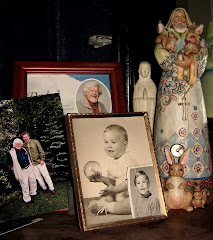I am beginning to realize and hence become able to communicate what I see as the major pitfall of "postmodernism" which is why I do not wish to be labelled as "postmodern" or in any way included in this way of looking at things.
It is Pontius Pilate in Jesus Christ Superstar who says to Christ:
"But what is truth? Is truth unchanging law? We both have truths--are mine the same as yours?"
Pontius Pilate is the voice of 'postmodernism' whose question 'what is truth?' reveals the skepticism at its heart. The lover of truth, the philosopher does not demand cynically the question 'What is truth?' but seeking it actually a priori posits its being as real and searchable. This is faith.
But to ask 'What is truth?' in the manner that Pontius does betrays a nihilistic ground to the question. He is being cynical, not asking to be enlightened or saved by Christ (who could very well have done so!). Hence Christ is silent and does not respond to this pseudo question... To question means to seek, to yearn for, desire...it is not a cynical jeer or a heartless skepticism. You will discover in your study of Christ's responses to questions in the Gospels that when the "questions" aimed at him are Pharasaical attempts to catch him up in a legal snare, or are inauthentic efforts at making the questioner look bright, or reveal cynicism that he never answers directly but responds with a question, or remains silent.
The second part of Pontius Pilate's speech is a postmodern interpolation of Tim Rice: "We both have truths---are mine the same is yours?" This kind of question is not found in ancient texts, it is Nietzschean in its roots, "everything is interpretation". This is the kind of thing Paul Ricoeur refers to as 'masters of suspicion' (Nietzsche, Marx, Freud). The hermeneutics of suspicion is betrayed at the core of each one of these "philosophies" in its theory of truth. Each master of suspicion "displaces" truth: Marx with class struggle, Freud with unconscious conflict and conscious 'rationalization' and Nietzsche the "resentment" of the Jewish moralist. Underlying each is a skepticism concerning truth in itself. This is not philoophy in the sense that Socrates undertook...(or St. Thomas, Kant, or even Descartes!).
The multitude or plurality of worldviews does not presuppose that truth is "relative" or open to endless interpretation but rather begs the question 'what is truth?' Now if the question is asked wholeheartedly, authentically and honestly, the answer is revealed in that search. But if the asker of the question hides a conviction that truth is relative, or open to endless permutation, etc... then he or she repeats the sophistic argumentation which Socrates founded philosophy upon as the 'logos' against the prevalence of a)doxa (opinion---could mean culturally held views) and b)muthos-uncritically accepted traditional religious beliefs unchecked by rational critique. In both cases, philosophy functions as a 'critique' seeking for 'episteme' or well justified knowledge.
But even 'episteme' does not count for Socrates as truth. Wisdom (sophia) consists in accepting the limitation of human reason as part of 'logos'. Hence Socrates poverty of dogma, and lack of published writings!
It is the grandeur of St. Augustine to realize that truth is given via faith, and that the function of philoophy is 'faith seeking understanding' (fides quaerens intellectum) or 'credo ut intelligam' "I believe so that I might understand!"
This then is the foundation of Catholic philosophy and the one that coheres with the apostolic mision of the Church. Truth quite simply is God's domain, and man has been invited, thank God, to participate in this enlightenment, this is Grace... Truth is revealed at the periphery where proud man surrenders acknowledging his intellectual limitations, and is answered by a loving God precisely at this point of humility and poverty.
Postmodernism like Pontius Pilate mocks 'truth' and no more humbly and honestly seeks to be enlightened or saved as it does to promulgate the irrational, unproveable opinion that "we both have truths". It is a very subtle and malingering form of deceit. What so innocently harbors 'multiculturalism', 'pluralism' is at root a profound act of sophistry which is in essence anti-philosophical!
Subscribe to:
Post Comments (Atom)




No comments:
Post a Comment